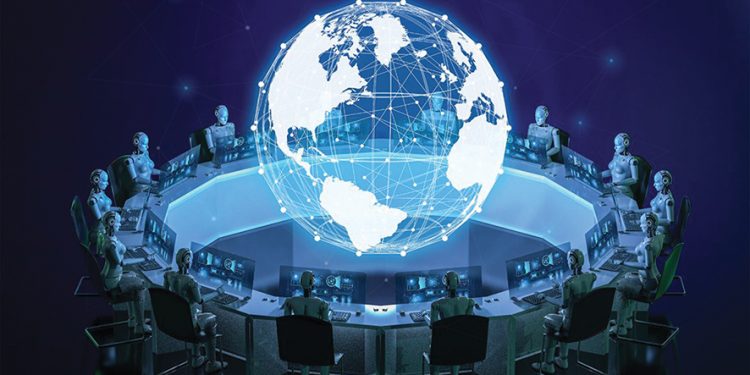The end of the Cold War not only heralded an idyll in international relations, but also promised maximum access to the accumulated economic benefits worldwide through various alliances, pacts or initiatives. It is indicative that Francis Fukuyama’s The End of History, which proclaimed the almost eternal, unconditional and irreversible “Good has triumphed over evil,” has become a kind of quintessence of the “Golden Era” attitude of the developed and developing world.
Fukuyama’s understanding of international politics was supposed to manifest itself in the global economic picture. And although globalism in the economy does not always equal the global economy, but here too the full irreversibility of cosmopolitanism, universalism or internationalism was expected.
Realignment to a new order: from openness to closure?
Accordingly, the idea of economic globalization in global geospace became a kind of mantra, and the opposite view was seen as “turning our backs on the world” and declared the object of an attack on total obstruction. The only exception in the “mainstream” was the creation of large trading blocs, which ultimately, again, contributed to the global economic texture. At first glance, this process in some places had the character of de-globalization, but only at first glance, as, in reality and in practice, its final result was the global universalization of the rules of the game in the world economy.
Thus, the very notion of “globalization” has turned into a synonym for economic welfare, while the practical forms and mechanisms of obtaining and redistributing this welfare have become the only topic of discussion. The economic drive towards globalization and the belief in the inevitability of this trend continued until several large-scale shocks rocked much of the world and the existing order.
Forced reversal
Over the past couple of decades, the world economy has suffered a number of blows. Each of them was unique in its individual nature and different scale.
Despite this abundance and diversity, among the major, so to speak, “systemically transformative” processes were and remain the financial crisis of 2008-2009, the COVID pandemic and post-pandemic processes, and the ongoing war resulting from Russia’s re-invasion of Ukraine. The latter posed a special challenge to Europe, which had to respond to two issues fundamental to it: importing cheap energy from Russia and exporting advanced technology to China. Both issues have a very expensive “price tag,” so it is no coincidence that, according to a poll conducted by the European Council on Foreign Relations think tank, 62% of Europeans would be in favor of neutrality in the event of a conflict over Taiwan.
Military operations in the Middle East are also developing dramatically, although at the time of writing this article, it is too early to draw definite conclusions.
In the given situation and in response to the shocks mentioned above, the natural reaction would be a greater diversification of economic linkages, even if this led to the need for additional costs or complex logistical solutions. In fact, a significant number of countries have chosen a different path, which we will discuss in more detail later. Here, we will only briefly note that this choice has linked the economy even more closely to geopolitics and security. We think that this link will remain relevant, at least for the foreseeable future.
Of particular note is that along with external, so-called exogenous developments, the larger economic picture is influenced by political changes within specific national systems. We will have a relatively extensive discussion about these changes and the vision and approaches that have emerged from them.
One thing is clear: the idyll and universalization of economic relations predicted for an indefinite period after the end of the Cold War has not stood the test of challenges. As a result, “managing the process according to plan” has also failed, which, along with a number of other disturbing symptoms, has manifested itself as:
(a) Increasing economic inequalities within countries;
(b) Deepening inequalities between the economic capacities of different countries or regions;
(c) The transformation of economic means into an instrument of pressure, which is known in the modern literature as the phenomenon of weaponization.
As a result, the harmonization of common rules of behaviour is hampered, in some places national economic systems go into a “defensive” mode, and global actors do not hesitate to justify basic policy decisions in the economy by selfish considerations.
The new industrial policy: who is acting how?
There is a growing tendency in the policies of players with significant influence on the global economy to look after themselves at the expense of the interests of others. At such times, we cannot call the practical measures or legislative initiatives anything other than a significant slowdown in the globalization of the economic structure and, in some cases, a revision of the results achieved in this regard or a demonstration of national-economic egoism motivated by the idea of self-sufficiency.
In the face of growing challenges in the world, a number of major countries have openly declared economic restructuring dictated by national security considerations. Such restructuring has three main objectives, which are equally prioritized, and thus a new industrial policy can only be measured by the implementation of all three together, namely:
(1) sufficient resource potential of the economy during crises and the resilience of the production base in stand-alone or isolated mode for a significant period of time;
(2) at the very least, to significantly reduce, if not paralyse, the potential for competing economies in times of global upheaval using the tools of modern economic warfare;
– and, as a result of the realization of both of the above objectives:
(3) in the medium or long term, gaining such an advantage on the geo-economic plane that will create a solid precondition for the realization of the desired geopolitical interests.
The fact is that the so-called new industrial policy is determined by economic actors of such caliber, which, more than others, have the task of consistently and responsibly participating in the world economy, maintaining the necessary balance between developed and developing countries creating fair and equal conditions necessary for development based on the imperative of global order and stability, but in stark contrast, in recent years we have witnessed the deepening of trends that seek to artificially stimulate the domestic market through overt protectionism, to reduce the coordination necessary to manage existing global threats, to destroy the reasonable standards of interconnectedness and interdependence necessary to tame the main ally of extremism and radicalism – poverty.
Even the summation of just a few such steps in this brief format indicates the occurrence of the essential features of the new industrial policy and, consequently, the coming (irreversibly?) of the era of the emergence of “autarchic protectionism” in the economy, with all its consequences.
For example, the stated purpose of the United States Inflation Reduction Act legislative initiative is to encourage green technology through subsidies and tax credits, whereas the purpose of the CHIPS and Science legislation is to encourage semiconductor manufacturing in the United States. The real motive behind this and many other initiatives and programs is to reduce the United States’ dependence on Asian markets, especially China, to gain a better position in the new geopolitical redistribution. Several large-scale projects launched by Beijing, be it the China 2025 Strategy or the Dual Circulation Policy, have the same spirit, the overall effect of which is to promote domestic consumption growth and increase concentration on the Chinese market itself. India has also followed this pattern by launching the Make in India project, the main essence of which is again to protect local production through official protectionist measures.
Although on other grounds, but under the slogan – “Everything for the front” – Russia has not fallen behind the trend of self-locking its own economy, and at this stage almost a third of the country’s budget expenditure will be used for “national defence”. For greater clarity: six per cent of Gross National Product will be spent on the needs of the war, that is, more than twice as much as was spent before the renewed aggression in Ukraine. In addition to direct military spending, more than nine per cent goes to ‘national security’. This increase in spending, along with social and infrastructure issues, is very much in line with economic isolationism and protectionism.
These are just a few illustrative examples, and the list can easily be extended with examples of the economies of the mentioned and other countries. Each of them is characterized by concern for its own needs at the level of public policy, and this without taking into account the relevance of proper reciprocity and common interests in international economic relations. Obviously, along with the risks of predictable development of the economic structure, this does not bode well for the overall security structure in a global sense.
And in general, even if we leave aside security and foreign policy, even in the “narrow” economic sense, the direct tangible negative consequences of such neo-isolationism, the same economic autarchy, are:
(1) maximum withdrawal from international economic linkages has a high probability of reducing the competitiveness of local advanced companies, the so-called national champions, together with the national economy;
(2) politics is breaking into the allocation of resources and the creation of supply chains, with the result that political and security needs subordinate sound economic laws;
(3) a timely and technocratic response to challenges in the economy can fall prey to insinuations among politicians;
(4) there is an increased likelihood of contentious cases, whether between countries or between trading blocs or regional alliances. A prime example of this is the high-profile dispute between Airbus and Boeing, which has had an unfavorable impact on trade relations between the United States and the European Union.
The private sector has not lagged behind the open protectionism officially declared by various countries. For example, the well-established terms “frandshoring” or “re-shoring” actually refer to the relocation of production from vulnerable geographic regions and unfriendly countries to relatively safe or low-risk jurisdictions. This process, of course, results in a shrinking global supply network with the ultimate goal of preventing and quickly recovering from unwanted, long-term or unpredictable supply and delivery disruptions.
The impact of the process on developing systems…
… is particularly important and noteworthy for us, as it is associated with many topical lessons for the Georgian economy. The trend mentioned in this article most notably negatively affects developing (i.e. emerging) economies, fuelled by geopolitical instability in addition to economic factors.
A number of developing countries have benefited specifically from the “era of globalization” that have been left behind (temporarily). First of all, this benefit has manifested itself in the redirection of trade and finance to these countries, which has been underpinned by:
(a) cheap local labor in the respective economies, and
(b) relatively easy and low-cost supply and delivery.
As a result of these very practical economic circumstances, the flow of direct investment into the developing world has been further enhanced by the “offshorization” of Western corporations or the transfer of business operations to developing countries.
A related result of the same process was that developing economic systems now obtained financial resources through direct investment (and not only loan capital) to invest in Western funds or securities. Moreover, such systems have gained additional benefits:
(a) instruments to hedge (i.e. manage) export and import risks;
(b) emergence of their own “national champions” – flagship companies;
(c) expansion of the market for national products;
(d) creation, in some cases, of a sufficiently resilient local stock market;
(e) access to advanced technologies, and
(e) even the creation of its own middle class, which is so important for the political and socio-economic sustainability of a country.
It is clear that the intensified “two-way street” between the developed and developing world (needless to say, Georgia has been left out of this process) has significantly increased the degree of interconnectedness and interdependence for globalization.
Thus, it is clear that the significant weakening of the globalization-internationalization-interconnectedness of economic systems at the end of the last century and the beginning of this one has proved to be quite harmful for the developing economic world as well. This damage will increase with the deepening process of de-globalization and the rise of economic nationalism. Therefore, this situation requires a timely and adequate systemic reorganization from an emerging economy.
Analysis by Victor Kipiani, Geocase Chairman














